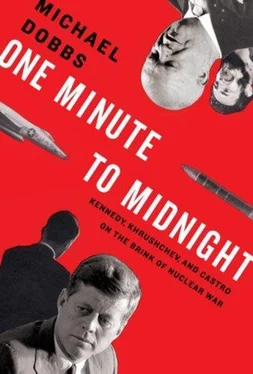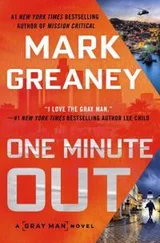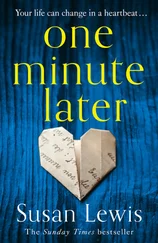Most troubling to Castro were signs that the Americans were trying to drive a wedge between him and his Soviet allies. He was amazed by American press reports suggesting that U.S. officials had grossly underestimated the numbers of Soviet troops in Cuba, and accepted Moscow’s description of them as “advisers” or “technicians.” It was hard to believe that the CIA knew less about these troops than it knew about the missile sites. To Castro’s suspicious mind, the Americans must have an ulterior motive for playing down the Soviet military presence. By talking about Cuban troops rather than Soviet troops, they were hoping that the Soviet Union would not defend Cuba against an American attack.
With both his brother Raul and Che Guevara out of Havana, Fidel’s closest adviser during this period was Osvaldo Dorticos, the Cuban president. Dorticos participated in Fidel’s meeting with Alekseev. The more the two Cuban leaders thought about it, the more they convinced themselves that time was running out.
An American attack is “inevitable,” an emotional Dorticos told the Yugoslav ambassador later that afternoon. “It will be a miracle if it does not come this evening, I repeat this evening.”
2:30 P.M. FRIDAY, OCTOBER 26
Bobby Kennedy was a chastened man. At the start of the missile crisis, he had demanded a much more aggressive sabotage effort against Cuba. He had persuaded his brother to approve a long list of targets, such as the Chinese Embassy in Havana, oil refineries, and a key railroad bridge. He had even talked about blowing up an American ship in Guantanamo Bay, blaming Castro, and using the incident as a pretext for invading Cuba. But the threat of nuclear apocalypse had caused him to rethink his views.
With the world on the brink of nuclear war, it was necessary to bring some order into the dysfunctional Mongoose operation. It was sometimes difficult to tell who was in charge of the clandestine effort to topple Castro. The nominal “chief of operations” was Edward Lansdale, but he was an impractical visionary, mistrusted and ridiculed by the CIA and some of his Pentagon colleagues. The CIA part of the operation was led by Bill Harvey, who had made his reputation in Berlin in the early fifties overseeing the construction of a tunnel that tapped into communications cables in the Soviet sector of the city. It later turned out that “Harvey’s hole” had been blown from the start by a Soviet double agent, but this did nothing to stop his ascent through the cloak-and-dagger world. “So you are our James Bond,” JFK had said with an ironic smile, when first introduced to the bald and paunchy Harvey.
By the time of the missile crisis, the Harvey legend had been dented somewhat by an excessive fondness for double martinis. He was barely on speaking terms with Lansdale, and made little secret of his disdain for the Kennedys, dismissing them as “fags” because they lacked the guts to take on Castro directly. He regarded Bobby as an interfering amateur, referring to him behind his back as “that fucker.” He was not much more respectful to his face. When RFK talked about taking anti-Castro Cubans out to his Hickory Hill estate in order to “train them,” Harvey asked, “What will you teach them, sir? Babysitting?”
RFK, meanwhile, felt no compunction about going behind Harvey’s back to establish his own contacts with the Cuban exile community in Miami. He had learned about a CIA plan to send sixty Cuban exiles to the island by submarine from an exiled Cuban leader, Roberto San Roman.
“We don’t mind going, but we want to make sure we’re going because you think it’s worthwhile,” San Roman had told him. Bobby discovered from Lansdale that three six-man teams had already been dispatched and seven more would soon be on their way. Another ten teams were being held in reserve. He was furious at Harvey for “going off on a half-assed operation” without his approval.
To sort matters out, RFK convened a meeting of the top Mongoose operatives in the windowless Pentagon war room known as “the Tank.” The session soon degenerated into bureaucratic sniping, with Harvey as the pinata. The CIA man was unable to explain who had authorized him to send in the teams. Bobby questioned the strategy of “using such valuable Cuban refugee assets to form teams to infiltrate Cuba at a time when security would be exceedingly tight…operational results questionable, and losses high.” Orders were issued to recall the three teams already on their way.
Reversing his earlier decisions, Bobby ruled out “major acts of sabotage” against Cuba as long as tensions were at boiling point. But he was not opposed to smaller-scale incidents that would be difficult to trace back to the United States. He agreed to attacks on Cuban-owned ships. “Sink in Cuban or [Soviet] Bloc ports, or high seas,” Lansdale’s memo read. “Sabotage cargoes. Make crews inoperative.” The attacks would be carried out by “CIA assets” on board Cuban vessels.
Harvey’s problems were compounded by General Maxwell Taylor, who asked about the sabotage operation against the copper mine in Matahambre that everybody else had forgotten about. Harvey did not have a satisfactory answer. The CIA had not heard from the two agents since their infiltration into Cuba on the night of October 19. Harvey muttered something about the men being “presumed lost.”
Since it was after lunch—and his customary double martinis—Harvey was not at his most articulate. He managed to hide his condition from most members of the Special Group, but he struck an old CIA colleague as “obviously plastered.” When Harvey had been drinking too much, he would settle his chin on his chest and mumble into his stomach in a deep voice, oblivious to everyone else in the room. He failed to appreciate the danger signal when Bobby announced that he had exactly two minutes to hear his explanation.
Two minutes later, Harvey was still droning on. Bobby picked up his papers and walked out of the room.
“Harvey has destroyed himself today,” CIA director McCone told his aides upon returning to Langley. “His usefulness has ended.”
McCone’s comment would prove prescient. There was, however, one piece of unfinished business of which he was entirely unaware. It involved Harvey, the Kennedy brothers, Fidel Castro, and the Mafia.
The FBI had been searching for John Roselli, an underworld boss under investigation for racketeering. The so-called “dapper don” was believed to be the Mafia’s representative in Las Vegas, making sure that the mob got its cut of the immensely lucrative casino revenues. The bureau had bugged his Los Angeles apartment and recruited informers to track his movements, but Roselli had somehow managed to slip away on October 19. The FBI lost track of him until the morning of Friday, October 26, when he flew into Los Angeles aboard a National Airlines flight from Miami under an assumed name.
What rank-and-file FBI agents did not know at the time was that the fifty-seven-year-old convicted mobster was working for the CIA, which had paid for his airline tickets, put him up in safe houses, and arranged for him to travel around the country incognito. They were also unaware that Roselli was the central figure in a series of futile attempts by the CIA to assassinate Castro, using snipers, bombs, and poisoned capsules. (FBI director J. Edgar Hoover had learned of the Roselli-CIA connection, but squirreled the information away for his own use.)
The CIA had recruited Roselli back in September 1960 at a time when the Eisenhower administration was thinking of moving against Castro. Prior to the Cuban revolution, the Mafia had controlled the casino business in Havana, but its assets were taken over by the Castro regime. Top CIA officials believed that the Mafia had both the motivation and the contacts in Havana to settle the score and promote American foreign policy interests at the same time. Harvey took over as Roselli’s case officer and principal contact in April 1962. Several weeks later, he delivered a package of four poison pills to Roselli, assuring him that they “would work anywhere at any time with anything.” The Mafia planned to use the pills against Fidel and Raul Castro and Che Guevara. Harvey also dropped off a U-Haul truck filled with arms and explosives in a Miami parking lot, and gave the keys to Roselli. The CIA man and the gangster would meet in Washington, Miami, or the Florida Keys, where they could drink each other under the table and hold conversations no one could overhear.
Читать дальше












